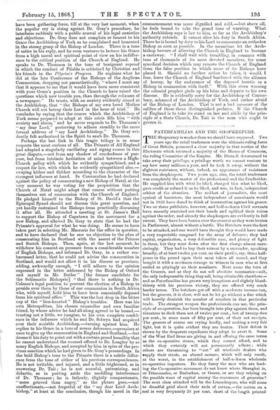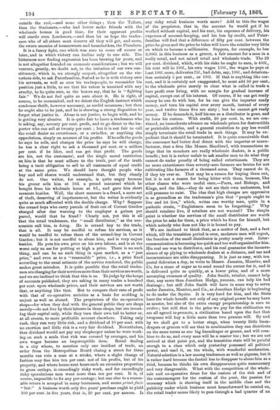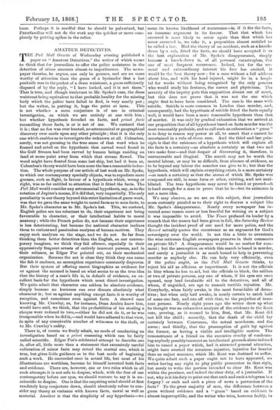PATERFAMILIAS AND THE SHOPKEEPERS.
THE Shopocracy is weaker than we should have supposed. Two years ago the retail tradesmen were the ultimate ruling force of Great Britain, possessed a clear majority in that section of the Electorate which returned a majority of the House of Commons, the ruling Committee of the Empire. Mr. Disraeli determined to take away their privilege, a privilege worth we cannot venture to say how many millions a year, and he took it away, without the slightest resistance, without, indeed, an appearance of resistance from the shopkeepers. Two years ago, also, the retail tradesman was completely the master of the professional and the landholder. He supplied him with what lie liked, charged him what he liked,. gave credit or refused it as he liked, and was, in fact, independent arbiter of the situation. The reddest of journalists, the most cynical of barristers, the most independent of annuitants would not in 1866 have dared to think of insurrection against his grocer. Two or three publicists, however, and half-a-dozen Civil servants have recently stretched out their hands and uplifted their voices against the order, and already the shopkeepers are evidently in full retreat. They have been beaten over the counter as they were beaten in Parliament, almost without a battle. The Butchers were the first to be attacked, and one would have thought they would have made a very respectable vanguard for the army of defence ; they had capital, organization, a very defensible case, and plenty of fight in them, but they went down after the first charge almost unre- sistingly. They had to buy their retreat by a surrender, speaking broadly, of at least twelve per cent. on their profits, say, three half- pence in the pound upon their meat taken all round, and they bought it with a meekness strange to witness in men who at first smiled so pityingly on their assailants. Next came the turn of the Grocers, and as they do not sell absolute necessaries—salt, the only indispensable thing they sell, being obtainable elsewhere— and as Paterfamilias has grown very bumptious and slightly blood- thirsty with his previous victory, they are offered very much harder terms. The butchers got off with a moderate income-tax, but the grocers, it is clear, will not be let go without a fine which will heavily diminish the number of retailers in that particular trade. The strongest weapon the professionals can use, the prin- ciple of co-operation, has been brought into play against them, and threatens to dock them not of twelve per cent., but of twenty-five per cent., in some cases of fifty per cent. of their net receipts. The grocers of course are crying loudly, and making a very fair fight, but it is quite evident they are beaten. Their defeat is shown by the desperate expedients they adopt to avert it. Some of the West End firms are giving in and offering the same terms as the co-operative stores, which they cannot afford, and to which they certainly will not permanently adhere ; while others are threatening to "cut" all wholesale dealers who supply their rivals, an absurd menace, which will only result, at the worst, in the establishment of half-a-dozen wholesale co-operative importers. Do they fancy the men who are lead- ing the Co-operative movement do not know where Shanghai is, or Trincomalee, or Barbadoes, or Genoa, or are they relying on the possible want of capital among the consumers of groceries ? The next class attacked will be the Linendrapers, who will come to dreadful grief about their reels of cotton,—the cotton on a reel is very frequently 20 per cent. short of the length printed
outside the reel,—and some other things ; then the Tailors, then the Stationers,—who had better make friends with the wholesale houses in good time, for their apparent profits will startle even Londoners,—and then let us hope the trades- men who of all others most deserve all they will get, and more, the sworn enemies of homeowners and householders, the Plumbers.
It is a funny fight, one which was sure to come off sooner or later, and in which victory can incline only to one side. The bitterness now finding expression has been brewing for years, and is not altogether founded on economic considerations ; but we will venture, greatly, we doubt not, to the irritation of our own con- stituency, which is, we strongly suspect, altogether on the vic- torious side, to ask Paterfamilias, flushed as he is with victory over his servants, as well as over his tradespeople, to reconsider his position just a little, to see that his valour is unmixed with any cruelty, to be quite sure, as the boxers say, that he is "fighting fair." We do not feel quite so sure about it. He is right, of course, to be economical, and we detest the English instinct which condemns thrift, however necessary, as sordid meanness ; but then he ought also to be just, and he is showing a strong disposition to forget what justice is. Abuse is not justice, to begin with, and he is getting very abusive, it is quite fair to leave a tradesman who is asking, say, seventy per cent. profit, and to go direct to the im- porter who can sell at twenty per cent. ; but it is not fair to call the retail dealer an extortioner, or a swindler, or anything else opprobrious, simply on account of his profits. If he sells the goods he says he sells, and charges the price he says he will charge, he has a clear right to ask a thousand per cent. or a million per cent. if he likes, and can get that profit. The goods are his, not the customers', and the single moral restriction on him is that he must adhere to the truth, part of the truth being a tacit obligation to sell to all customers of equal credit at the same price. We should have thought people who buy and sell shares would understand that, but they clearly do not. One writer, for example, is quite angry because his grocer sells him at 16d. a pound macaroni which he bought from his wholesale house at 8d., and gave him short measure besides. Well, the short measure is a fraud, a mere act of theft, deserving of imprisonment, but the writer is evidently quite as much affronted with the double charge. Why? Suppose the errand boys who carry parcels of fruit out of Covent Garden charged after due warning to the employer a guinea per parcel, would that be fraud ? Clearly not, yet this is all that the retail tradesman, the "small distributor," as the eco- nomists call him, is doing. He is errand boy to the trade, that is all. It may be needful to refuse his services, as it would be needful to refuse those of the errand-boy in Covent Garden ; but it is not needful to abuse him, and is very unjust besides. He puts his own price on his own labour, and is at the worst only an ass for putting so high a price. There is no such thing, and can be no such thing in open market, as a "just price," and even as to a " reasonable " price, i.e., a price fixed according to the usual estimate of the service rendered, the public makes great mistakes. It is quite possible that the retail trades- men are charging for their services more than their services are worth, and we are inclined to think that this is so. To judge by the heaps of accounts published, they are asking in many trades a hundred per cent. upon wholesale prices, and their services are not worth that, or anything like that. But to compare their rate of profit with that of co-operative societies as a basis for scolding is unjust as well as absurd. The proprietors of the co-operative shops—for when they deal with the general public they are shops merely—do not live by their labours in those shops, but are invest- ing their capital only, while they turn their own toil to better or, at all events, to more profitable account elsewhere. Taking only cash, they run very little risk, and a dividend of 10 per cent. with no exertion and little risk is a very fair dividend. Nevertheless, that dividend would not pay any shopkeeper unless he were work- ing on such a scale that risk was covered by averages, and his own wages became an imperceptible item. Retail dealing in a city where, to mention only one incident of trade, an order from the Metropolitan Board closing a street for three months can ruin a man at a stroke, where a slight change of fashion may fine him ten per cent, not of his profits, but of his property, and where house-rent bears such an excessive proportion to gross outlays, is exceedingly risky work, and for exceedingly risky speculations men want more than ten per cent. It is, of course, impossible to fix any per-centage; but one clue to a reason- able return is accepted in many businesses, and seems prima facie "fair." A business worth only five years' purchase ought to yield 100 per cent. in five years, that is, 20 per cent, per annum. Is Iany risky retail business worth more? Add to this the wages of the proprietor, that is, the amount he would get if he worked without capital, and his rent, his expenses of delivery, his expenses of account-keeping, and his loss by credit, and Pater- familias will find that a difference of fifty per cent. between the price he gives and the price he takes will leave the retailer very little on which to become a millionaire. Suppose, for example, he has 2,000/. in this business as a grocer, a fair amount for a man in a really retail, and not mixed retail and wholesale trade. The 20 per cent. dividend, which, with his risks he ought to earn, is 4001., his rent will be 100/., his own wages 150/., the wages he pays at least 100/. more, deliveries 751., bad debts, say, 1001., and deteriora- tion certainly 5 per cent., or 100/. If that is anything like cor- rect, and it is certainly not exaggerated, he must add 50 per cent. to the wholesale price merely to clear what is called in trade a bare profit over living, with no margin for gradual increase of capital, except out of his interest. Of course, if he can get ready money he can do with less, for he can give the importer ready money, and turn his capital over every month, instead of every year, and twelve times five are sixty ; but he cannot get ready money. If he demands it, half his use as a distributor is gone, and he loses his custom. With credit, 50 per cent. is, we are con- vinced, no immoderate advance on wholesale prices for destructible or perishable articles, and a general resolution to pay less would simply terminate the retail trade in such things. It may be ex- pedient that it should be terminated. It is quite conceivable that the consumer had better deal direct with the importer or manu- facturer, that a firm like Messrs. Shoolbred, with transactions so large that its members are really wholesale dealers, is a public benefit ; but it is rather unfair to ask smaller men to do what they cannot do under penalty of being called extortioners. They are no more extortioners than seventy-acre farmers are brutes for not cultivating like farmers of a thousand acres. They cannot do it, if they try ever so. That may be a reason for buying them out, but it is not a reason for being bitter with them, because, like other classes who were useful once,—Peers, and Bishops, and Kings, and the like,—they do not see their own uselessness, but still presume to exist. The idea that high charges are oppressive is as groundless as the tradesmen's plea that "people ought to live and let live," which, writes one worthy man, quite in a pathetic strain, "Englishmen seem to be forgetting." Why should retailers live, if retailers are not wanted? The simple point is whether the services of the small distributor are worth the price he asks for them, a price which he fixes for himself, but which nobody who does not like it is bound to pay.
We are inclined to think that, as a matter of fact, and a fact which, till the transition period is over, moderate men will regret, the function of the small distributor is pretty nearly over. Inter- communication is becoming too quick and too well organized for him. His real use was to distribute, and his real guarantee the inconve- nience of ap plying to wholesale dealers at a distance, and use and inconvenience are alike disappearing. It is just as easy, with ten postal deliveries a day, to write to Messrs. Jamaica, Maurice, and Co. for a stone of sugar as to send round the corner for it, and it is delivered quite as quickly, at a lower price, and of a more unvarying evenness of quality. John Smith, retailer, cannot help that, any more than Jonathan Hodge, yeoman, can help his bad drainage ; but still John Smith will have in some way to serve under Jamaica, Maurice, and Co., as Jonathan Hodge is beginning to do under the Squire. It is very hard for him, and the State loses the whole benefit not only of any original power he may have as master, but also of the extra energy proprietorship is sure to evolve ; but still that is the price we pay for the civilization we are all agreed to promote, a civilization based upon the fact that twopence will buy a little more than two pennies will. By and by we shall get to a better stage, when twenty little linen- drapers or grocers will see that in combination they can distribute on the same terms as one big linendraper or grocer, and will com- bine to do so, and every man will be a master too ; but we are not arrived at that point yet, and the transition state will be painful enough to a class which only yesterday possessed all political power, and used it, on the whole, with wonderful moderation. Natural selection is a law among tradesmen as well as pigeons, but it is rather hard because the fantail has to disappear to abuse him as a thief, because he thinks his own disappearance quite unnecessary and very disagreeable. What with the competition of the whole- sale and co-operative firms for the custom of the rich and of the costermongers for the custom of the poor, the passion for economy which is showing itself in the middle class and the publicity under which business must henceforward be carried on, the retail trader seems likely to pass through a bad quarter of an
hour. Perhaps it is needful that he should be pulverized, but Paterfamilias will not do the work any the quicker or more com- pletely by putting spikes in the roller.
































 Previous page
Previous page